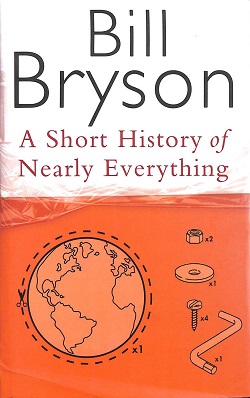As I go
more through this book, I get more amazed seeing its wide coverage over so many
topic in so simpler yet brilliant way. I love it more and more. The book is
almost 600 page thick, and I have just gone through 115 pages, and its really
good. Whether its astronomy, geology or anything, it covers them all. And I am
looking forward to finish the book very soon, and I am excited about the fact
that how brilliant it would feel. In this short article I would be presenting
some of good facts and paragraphs through this book.
Chapter
one- Lost in the cosmos (Summary)
-Timespan
of Paleozoic era- 545 to 245 Millions of Years ago
-Timespan
of Mesozoic era- 245 to 66.4 Millions of years ago
-Average
species on earth, lasts for only about 4 Million years. So if you wish for
billions of years of life you must be as fickle as atoms that made you.
-Not one
of your ancestors was squashed, devoured, drowned, starved, untimely wounded or
otherwise deflected from its life’s quest to deliver tiny charge of genetic
material to right partner at right moment to perpetuate only possible sequence
of hereditary combination to result an astounding you.
-Talking
about other things, the dot in ‘i’ holds 500000000000 protons.
-When
universe expands it won’t be spreading out to fill a larger emptiness. The only
space that exists is space it creates as it goes.
-They say
that the first lively second after big bang produced gravity and other forces
governing physics. In less than a minute universe was growing millions and
billions miles across and growing fast.
- The big
bang produced tens of billions of temperature enough to begin nuclear reaction
creating lighter elements such as Hydrogen and helium.
- Many
scientists are involved to know the beginning of everything in this universe.
Inflation theory was given by Robert Dicke. They explained the fact that after
creation universe went on to double its size in every 10^-34 seconds. Other
scientists such as Penzious and Wilson didn’t understood the hissing sound in
their experimental set off later found to be different waves that linked with
the universe beginning.
- Can you
get to the edge of Universe? Off course practically we can’t but can we make
our head pop out of universe to see what’s out there beyond universe? The
answer may disappoint you because you would never arrive at the boundary,
instead you would come back to where you begin because the universe bends in a
way we can’t adequately imagine. Spaces curves in a way that allows it to be
boundless but finite. Space itself is not expanding rather galaxies are running
apart.
- Universe
is not only queerer than we suppose, it is queerer than we can suppose.
-Not one
stuff so vital to our own existence like carbon, Nitrogen, Oxygen and rest
emerged from gaseous brew of creation. But to form such heavy elements other
forces as big as big bang is necessary. Yet there’s been only one big bang and
it didn’t produce them, so where did they come from?
-Coming to
the solar system, Pluto is no longer considered as planet, the reason comes to
be that Pluto has moon comparative to the planets size much bigger. It is so
far that no one could actually tell its random motion, its composition, its
atmospheric composition, or even what it really is. They say its even smaller
than the combined area of USA.
-We have
up to now been able to have maximum speed of 56000 km per hour in super
rockets. And approximately 90 moons in our solar system.
- Do you
know how our solar system ends? It ends with the Oort cloud, which starts
beyond Pluto and extends somewhat 2 light years beyond.
-Our
nearest neighbor Proxima Centauri is even 4.3 light years away.
-There are
4 hundred billion stars in Milky Way Galaxy. And altogether there are 140
billion galaxies out there. Probability suggests there are millions of intelligent
life like us present throughout the universe, that the life is not so much rare
or scares.
-We may
only be one of millions of advanced civilization, with spacing in between at
least 2 hundred light years.


-If star
collapsed to sort of densities found in core of atoms, the result would be an
unimaginable compact core. Atoms would be crushed so that electrons would be
forced into nucleus forming neutron. Hence we call it neutron star.
-Zwicky
formed concept of dark matter. And neutron star shrank forming black hole.
-Did you
know, only 6000 stars visible from earth through naked eye, two thousands from
one spot?
-Evans was
one of Supernova freak. He would even place telescope in kitchen room, in his
dining table to look at sky occasionally to hunt supernova.
- For
blast of supernova to kill you, you would have to be ridiculously close, within
10 light years. The closest detected supernova candidate star is Betelgeuse
which is 50000 light years from earth, so we don’t need to worry about being
killed by such accidents.
-As
discussed earlier, the big bang had produced light elements like hydrogen and
helium but failed to create heavier and essential components of life like
oxygen, carbon, iron etc. Later on, we found something astonishing, we found
out that to forge such heavy elements we need something even hotter than middle
of hottest star- supernova. That means star explosion resulted in the formation
of heavy elements.
-Coming to
solar system, condensation of 98% of nebular mass formed sun and rest formed
the planets. 4.4 billions Of years ago, object size of mars crashed into the
earth to form moon.



0 Comments